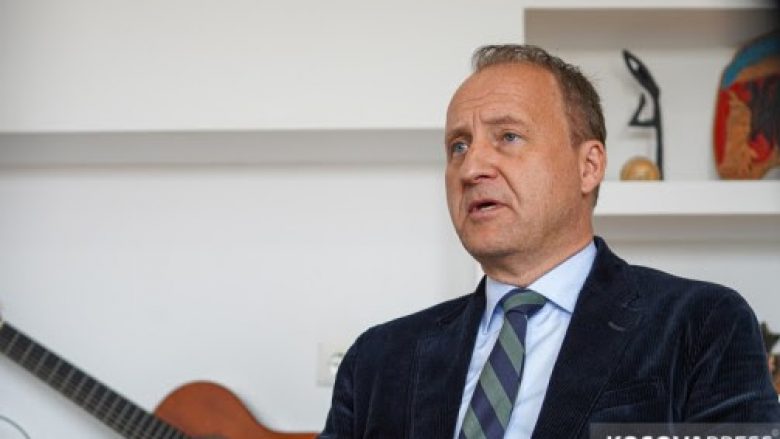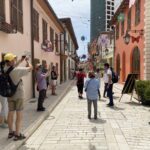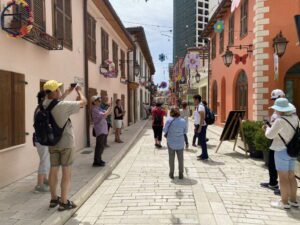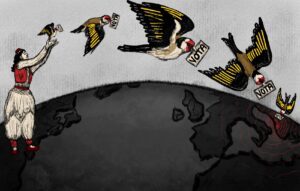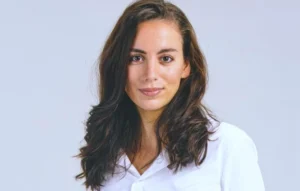Norwegian Ambassador Jens Erik Grøndahl thinks the situation in Kosovo and the region is calm, despite growing concerns following the Russian aggression in Ukraine. Recently, police officers have been the target of several attacks, which the ambassador strongly condemned, saying such incidents are unacceptable.
In an interview with KosovaPress, Ambassador Grøndahl also talks about the Kosovo-Serbia dialogue and the cooperation between our country and Norway.
Referring first to the security situation, the Norwegian ambassador said that in addition to concerns related to the attack on police officers in Zubin Potok, in general the situation in the country has been safe.
“I do not think so far I have seen any immediate concern as a direct effect of the conflict in Ukraine,” he said. And I think it is very important to be vigilant and careful, as you know, we rely a lot on the information we receive from security organizations in Kosovo, such as the KSF and KFOR, EULEX and the OSCE, and so on. So, we follow the advice and information we receive from the authorities in Kosovo and from the institutions. Of course, we are deeply concerned about the recent shootings in Zubin Potok. We have condemned this, we have supported the Kosovo government, we are concerned about these incidents and we think they are a real threat to stability. As far as I know, it has not been possible to find out exactly who the perpetrators are. So I think we should wait for the investigation to end, but any such incident is absolutely unacceptable and it should not happen in any way. So, yes, regarding that specific incident, I think we have deep concerns, but in general, I think that the region inside and around Kosovo has been quite stable even after the outbreak of the conflict in Ukraine “, declared Grøndahl.
Serbia is the only country in Europe that has not lined up with the West to sanction Russia following developments in Ukraine, and was even accused of becoming a gateway to Europe for the Russians.
In this regard, Ambassador Grøndahl says that they are closely following what Serbia is doing.
“We are pleased that Serbia voted with us and most of the world in condemning Russia in the UN Security Council, and also in expelling Russia from the UN Human Rights Committee, we are happy that they have followed the same line as any EU and NATO country, and the European continent, as well as Kosovo. But in terms of sanctions, we are obviously carefully monitoring what each country is doing in this regard. “But so far, we are watching what they are doing and it will definitely be interesting to see what next step they can take when developments go further,” Grøndahl continued.
The Norwegian diplomat also spoke about the Kosovo-Serbia dialogue.
Finally, the parties did not agree to find a permanent solution to the license plate issue, while another meeting is scheduled for May 13.
The ambassador says that, despite the fact that the interim agreement with the adhesives is working, a final solution is needed.
“I hope so and we need a solution to this situation. I believe that practically, the sticker ticket regime is working very well, but we absolutely support a final agreement on the license plates, but also on all the other issues that remain to be implemented by the Brussels agreements. We would like to see freedom of movement, freedom of travel, for documentation to be accepted by all, car license plates as well, as long as they meet the criteria of best European practice for car license plates. So I hope that soon there will be a solution to this problem, so that as soon as possible we have a free movement of goods, people and travel. “This is actually our hope,” said Grøndahl.
The Norwegian ambassador said that he respects Kosovo’s positions at the negotiating table and adds that it is good to be careful. He reiterated that his country supports the Kosovo-Serbia dialogue that would produce a final agreement with mutual recognition.
Grøndahl added that he understands the difficulties and that there are still many issues to be discussed between the two countries, but both sides must make efforts to find solutions to the open issues.
“We respect Kosovo’s positions and we understand that this is not an easy agreement to make. There are many considerations involved. I think it is very good to be careful and to consider the implementation well. I do not think that acceleration will be useful, because there may be problems, bypasses are made, so it is important to work very carefully and seriously on this. Of course, we support the Kosovo government for the dialogue process, for a positive dialogue process to reach a final agreement with Serbia and the EU. This is what we also call authority
in Belgrade, as well as for them to make efforts to reach and find a common language with Kosovo on these issues. So I understand it takes time, but I absolutely have hope, and I am optimistic that at some point, I hope not too far away, there will be an agreement, but I do not think it will be an easy path, I think it will be with difficulty. I think there are a lot of issues to discuss, and there are a lot of complicating factors that have consequences for both countries, and I understand that both sides would like to see what the consequences might be of reaching an agreement. But yes, we support the process, we support the Lajcak-led dialogue in Brussels and we absolutely hope that the parties will reach an agreement. “So this is absolutely our support,” he said.
Asked if he was optimistic that a final agreement could be reached within this year, the ambassador replied “yes”.
“I hope so, I would like to say yes to this (reaching a final Kosovo-Serbia agreement within this year), absolutely. I would like to say yes to that. We also have some ninety-ten months left from this year. So I have a lot of hope. “Yes,” he said.
Norway has consistently supported Kosovo through various projects, especially in the justice system as well as with advisers for dialogue and European integration.
Ambassador Grøndahl says they already want to focus more on tourism to bring more Norwegians to Kosovo.
“We have a limited trade cooperation with Kosovo, we have had a cooperation in the field of industrial production, but we have some money with which we support the reforms in Kosovo, so mostly what we have assessed, in establishing the justice sector in Kosovo. We have made significant investments in the electronic case management system for the courts, the Palace of Justice in Prishtina, which has been an absolutely great success. We have also invested in economic growth in Kosovo through startup initiatives, and so on, we also support dialogue and institutions, as you know, I am also working very concretely to see if we can do more in the field of tourism, because I think Norwegians would feel at home in Kosovo, with mountains, beautiful villages, very hospitable people, very good food, and a lot of good cultural events happening all year round. We have direct flights from Oslo to Pristina several times a week. So, now after the pandemic, I think it is time for us to connect Norway and Kosovo much stronger than we have been able in the past “, he said.
Asked if the Norwegians know about Kosovo as a country, the ambassador replied “yes and no”. Recalling the period of war for which the Norwegians had supported Kosovo Albanians, Grøndahl says he would like to see more people from his country visit Kosovo.
“Kosovo was absolutely on everyone’s mind in the late ’90s because of the conflict, unfortunately, but it’s true. So I think a lot of people felt pain for the people in Kosovo at that time. Norway was one of the first countries to recognize Kosovo and we have supported Kosovo in consolidating it as a new European country. So, in this sense, I think that there are good words for Kosovo in Norway. But as a tourist destination, I think we need to do a lot more. We have approximately 17,000 Norwegians from Kosovo. They are doing a great job talking a lot about Kosovo in Norway, but I would like to see more people coming here, because it is not too far, people would feel safe and good in Kosovo. I also like the mountains, and these places we talked about. “So I think this is absolutely possible to do more,” concluded Ambassador Grøndahl.

